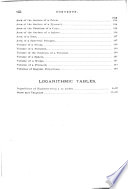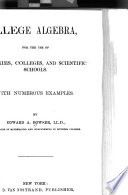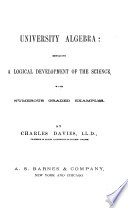 | Stephen Roper - Mechanical engineering - 1884 - 740 pages
...squared. hms. and Define the terms logarithms and hyperbolic logarithms, explain their use. Answer. — The logarithm of a number is the exponent of the power to which it is necessary to raise a fixed number in order to produce the first number. The use of logarithms is to abridge numerical... | |
 | Electronic journals - 1902 - 232 pages
...of mathematics and physics meets logarithms for the first time at an early stage. He is told that " the logarithm of a number is the exponent of the power to which a certain number, taken as the base, must be raised in order to equal the given number." The definition... | |
 | Charles Davies, Adrien Marie Legendre - Geometry - 1885 - 538 pages
...TRIGONOMETRY AND MENSURATION. INTRODUCTION TO TRIGONOMETRY. LOGARITHMS. 1. The LOGARITHM of a given number is the exponent of the power to which it is necessary to raise a fixed numbe: to produce the given number. The fixed number is called THE BA8E OF THE SY8TEM. Any... | |
 | Edward Albert Bowser - Algebra - 1888 - 868 pages
...LOGARITHMS— EXPONENTIAL AND LOGARITHMIC SERIES— INTEREST AND ANNUITIES. LOGARITHMS. 202. Definitions. — The Logarithm of a number is the exponent of the power to which another number, called the base, must be raised to equal the given number. Thus, if a* = N, x is called... | |
 | Charles Davies - Algebra - 1889 - 330 pages
...the Appendix, after the general demonstration of the Binomial Formula. CHAPTER XI. LOGARITHMS. 182. THE LOGARITHM of a number is the exponent of the power to which it is necessary to raise a fixed number to produce the given number. The fixed number is called the base of the system. 183.... | |
 | John Bernard Clarke - Algebra - 1889 - 566 pages
...the upper course being 13» and in each side of the lowest course 50. CHAPTEE XI. LOGARITHMS. 509. The Logarithm of a number is the exponent of the power to which it is necessary to raise a fixed number in order to produce the given number. Thus, in the equation a x =N, a being a fixed... | |
 | Edwin James Houston - Electrical engineering - 1889 - 684 pages
...record of its actual speed at any time during the entire run. Logarithms. — The logarithm of any given number, is the exponent of the power to which it is necessary to raise a fixed number, in order to produce the given number. A table of logarithms enables the operations... | |
 | William Findlay Shunk - Railroad engineering - 1890 - 360 pages
...HW High water. LW Low water. LOGAEITHMS. I. -II. ¡ LOGARITHMS. ' i. DEFINITIONS AND PRINCIPLES. 1. THE logarithm of a number is the exponent of the power to which it is necessary to raise a fixed number to produce the given number ; that is to say, it represents the number of times a fixed... | |
 | William Findlay Shunk - Railroad engineering - 1890 - 372 pages
...zero plane. HW HiJh weíer. LW Low water. , LOGAElTHMS. LOGAEITHMS. DEF1N1T1ON8 AND PR1NC1PLE8. 1. THE logarithm of a number is the exponent of the power to whieh it is neeessary to raise a fixed number to produee the given number; that is to say, it represents... | |
 | Charles Davies - Algebra - 1891 - 306 pages
...by M, 10" = M. Thus, if we make m = 0, M will be equal to 1; if m = 1, M will be equal to 10 ; etc. Hence The logarithm of a number is the exponent of...base of the system in order to produce the number. 217. If, as before, 10 denotes the base of the system of logarithms, m any exponent, and Jf the corresponding... | |
| |